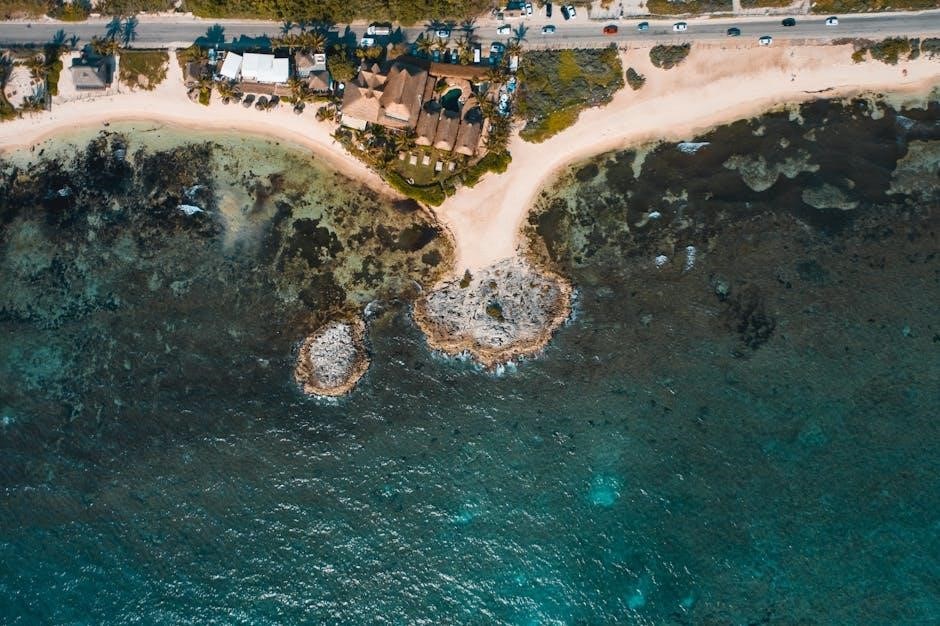customs power of attorney pdf
Summary
Get your Customs Power of Attorney form as a downloadable PDF. Fill out and print your template today!

Overview of Customs Power of Attorney
A Customs Power of Attorney (POA) is a legal document authorizing an agent to act on behalf of an importer/exporter in customs matters, ensuring compliance and smooth clearance processes.
1.1 Definition and Purpose
A Customs Power of Attorney (POA) is a legal document empowering an agent to act on behalf of an importer or exporter in customs-related matters. Its purpose is to grant authority for tasks such as signing customs entries, declarations, and handling import/export documentation. This ensures compliance with regulations, streamlines clearance processes, and avoids delays, while also outlining the scope of the agent’s responsibilities and the POA’s validity period.
1.2 Importance in Customs Clearance
A Customs Power of Attorney is crucial for efficient customs clearance, enabling agents to handle import/export documentation, sign entries, and comply with regulations. It streamlines procedures, reduces delays, and ensures legal compliance, allowing businesses to operate smoothly while adhering to customs requirements. This document is essential for maintaining operational efficiency and avoiding potential penalties or clearance issues;
Key Elements of a Customs Power of Attorney
A Customs Power of Attorney must include the grantor-agent relationship, scope of authority, termination clauses, and notarization requirements to ensure validity and compliance with customs regulations.
2.1 Grantor and Agent Relationship
The grantor (importer/exporter) appoints an agent (customs broker or attorney) to act on their behalf. This relationship is legally binding, granting the agent authority to handle customs entries, declarations, and other required documents. The grantor retains control over decisions, while the agent executes tasks, ensuring compliance with customs regulations and facilitating smooth clearance processes.
2.2 Scope of Authority (e.g., signing customs entries, declarations)
The Customs Power of Attorney grants the agent authority to sign customs entries, declarations, certificates, bills of lading, and other required documents. This includes endorsing, declaring, or swearing to any paperwork necessary for import/export processes. The agent can also represent the grantor in customs visits and provide documents for clearance, ensuring compliance with all relevant regulations and procedures.
2.3 Termination Clause
The termination clause outlines the conditions under which the Customs Power of Attorney can be revoked or ended. It typically requires written notice, such as a registered letter, from either party. The POA remains effective until termination, ensuring clarity on the agent’s authority duration. This clause prevents unauthorized actions after the relationship ends, maintaining legal and procedural integrity.

Types of Customs Power of Attorney
Customs Power of Attorney can be general, limited, durable, or special, each serving distinct purposes for importers and exporters in managing customs-related activities efficiently.
3.1 General Power of Attorney
A General Power of Attorney grants broad authority to an agent, enabling them to handle all customs-related matters, including signing entries, declarations, and other documents. This comprehensive authorization streamlines processes for importers and exporters, ensuring efficient customs clearance and compliance with legal requirements. It remains in effect until explicitly revoked or terminated by the grantor.
3.2 Limited Power of Attorney
A Limited Power of Attorney restricts the agent’s authority to specific customs-related tasks, such as handling import declarations or processing particular shipments. It is ideal for importers or exporters who wish to grant limited control to their representatives. This type of POA ensures the agent operates within defined boundaries while still facilitating efficient customs clearance. It remains effective until revoked or terminated by the grantor.
3.3 Durable Power of Attorney
A Durable Power of Attorney remains effective even if the grantor becomes incapacitated, ensuring uninterrupted customs representation. It includes specific clauses like “Actions by Grantor” and “Termination,” allowing the agent to handle customs entries, declarations, and other required documents seamlessly. This type is ideal for long-term import/export operations, maintaining continuity in customs procedures regardless of the grantor’s capacity.
3.4 Special Power of Attorney
A Special Power of Attorney grants limited authority to an agent for specific customs-related tasks, such as signing entries, submitting declarations, or handling particular shipments. It outlines exact responsibilities and durations, ensuring the agent acts strictly within defined boundaries. This type is suitable for importers/exporters needing targeted representation without broader authorizations, as detailed in customs forms and legal documents.
Benefits for Importers and Exporters
A Customs Power of Attorney simplifies customs clearance, enabling agents to handle declarations, submissions, and compliance efficiently, reducing delays and ensuring adherence to regulatory requirements.
4.1 Streamlined Customs Procedures
A Customs Power of Attorney allows agents to handle customs entries, declarations, and document submissions efficiently, reducing processing times and potential delays. This streamlined approach ensures all necessary paperwork is completed accurately, enabling a smoother clearance process and maintaining regulatory compliance without direct involvement from the importer or exporter.
4.2 Compliance with Regulations
A Customs Power of Attorney ensures compliance with customs regulations by authorizing agents to accurately complete and submit necessary documents, such as CBP Form 5291. Proper execution, including notarization and witness requirements, guarantees the POA’s validity, enabling seamless adherence to legal standards and avoiding potential penalties or delays in customs processing.

Legal Requirements for a Valid Customs Power of Attorney
A valid Customs Power of Attorney requires notarization, witness signatures, and completion of CBP Form 5291 to ensure legal authenticity and compliance with regulations.
5.1 Notarization and Witness Requirements
A Customs Power of Attorney must be notarized and witnessed to ensure authenticity. The notary public verifies the grantor’s identity and authority, while witnesses confirm the signing process. This step is crucial for enforcing the POA under customs law. Proper notarization ensures the document’s legality and validity in all customs proceedings.
5.2 CBP Form 5291 (Power of Attorney)
CBP Form 5291 is a standardized document used to establish a Power of Attorney for customs purposes. It allows importers/exporters to designate a customs broker or agent to act on their behalf. The form must be completed accurately, detailing the scope of authority and the parties involved. It is a legal requirement for agents to handle customs clearance and related procedures.
How to Create a Customs Power of Attorney
Start by drafting the POA document, ensuring all necessary details are included. Have it notarized to authenticate the signatures. Finally, submit the completed form to customs authorities.
6.1 Preparation and Execution
Preparation involves drafting the POA document, ensuring it includes all necessary clauses, such as termination conditions and compliance statements. The grantor and agent must review and sign the document in the presence of a notary public to authenticate the signatures. The POA should clearly outline the scope of authority and meet all legal requirements for validity.
6.2 Submission to Customs Authorities
After execution, the POA must be submitted to the relevant customs authorities, typically alongside CBP Form 5291. The document should be notarized and include all required signatures. It’s essential to ensure the POA is filed correctly to avoid delays in customs clearance. Proper submission ensures the agent’s authority is recognized, facilitating smoother import and export operations.

Common Mistakes to Avoid
- Incomplete or missing information in the POA document can lead to delays or rejection by customs authorities.
- Failure to properly notarize or witness the document can render it invalid.
7.1 Incomplete or Missing Information
One of the most common mistakes is providing incomplete or missing information in the Customs Power of Attorney document. This includes omitting the grantor’s details, scope of authority, or termination clauses. Such oversights can lead to delays in customs clearance or even rejection of the document. Ensure all sections, such as signing customs entries or declarations, are clearly specified to avoid complications.
7.2 Failure to Revise or Terminate Timely
Failing to revise or terminate a Customs Power of Attorney in a timely manner can lead to unnecessary delays or compliance issues. If the POA is no longer valid or needs updates, it must be addressed promptly to avoid complications. Always ensure the document remains current and accurately reflects the authority granted to the agent. Regular reviews are essential to maintain its validity and effectiveness.

Best Practices for Using a Customs Power of Attorney
Regularly review and update the POA to reflect changes in business needs or regulations. Maintain secure storage of the document to prevent unauthorized access or misuse.
8.1 Regular Review and Updates
Regularly reviewing and updating a Customs Power of Attorney ensures it remains relevant and compliant with changing regulations. This practice helps prevent operational disruptions and legal issues, ensuring the agent’s authority aligns with current business needs and legal requirements. Annual audits are recommended to verify accuracy and make necessary adjustments promptly.
8.2 Secure Storage of Documents
Securely storing Customs Power of Attorney documents is crucial to prevent unauthorized access or loss. Maintain both physical and digital copies in locked cabinets or encrypted files. Limit access to authorized personnel and regularly back up documents using secure methods, such as external drives or encrypted cloud storage. Organize files for easy retrieval and ensure confidentiality throughout the process.
Where to Find Templates and Legal Assistance
Official customs websites and legal firms offer downloadable Customs Power of Attorney templates. Consult customs brokers or attorneys for professional guidance and accurate document preparation.
9.1 Official Customs Websites
Official customs websites, such as CBP.gov, provide downloadable Customs Power of Attorney templates and detailed instructions. These resources ensure compliance with legal requirements and streamline the document preparation process. Users can access forms like CBP Form 5291, along with guidelines for execution and submission. This is a reliable source for accurate and up-to-date information.
9.2 Legal and Customs Broker Services
Legal firms and customs brokers offer specialized services to prepare and review Customs Power of Attorney documents. They ensure compliance with regulations and provide expert guidance on drafting, notarization, and execution. These professionals handle complex cases and offer tailored solutions, making the process efficient and stress-free for importers and exporters.
A Customs Power of Attorney is essential for efficient customs operations, ensuring compliance and simplifying procedures. It empowers agents to act on behalf of importers/exporters, streamlining processes effectively.
10.1 Summary of Key Points
A Customs Power of Attorney is a legal document granting authority to an agent to handle customs matters, ensuring compliance and streamlined procedures. It is essential for importers/exporters, covering document signing, declarations, and representation. Key elements include notarization, scope of authority, and termination clauses. Proper execution and submission to CBP are critical for validity, avoiding delays in customs clearance processes. Regular updates and secure storage are recommended.
10.2 Final Recommendations
Ensure your Customs Power of Attorney is properly notarized and submitted to CBP using Form 5291. Avoid common mistakes like incomplete information and delays in termination. Regularly review and update the document to reflect operational changes. Store it securely and consult legal experts for complex cases to maintain compliance and streamline customs processes effectively.